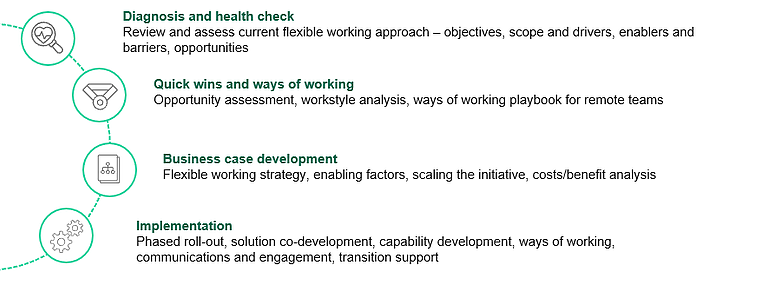Canadian Hydrogen Observatory: Insights to fuel…

The response to COVID-19 is a prime example of Kotter's 'Burning Platform.' The global crisis presents a scenario many businesses and governments have never experienced before but need to adjust to.
The response to COVID-19 is a prime example of Kotter's 'Burning Platform.' The global crisis presents a scenario many businesses and governments have never experienced before but need to adjust to. Huge portions of the global workforce are being instructed to practice "social distancing" while maintaining productivity and staying connected. Organisations have no choice but to trust their people to work remotely, adapting the way they work individually and in teams. In just a few weeks, the way we all work changed. For some organisations, it's been an extension of what they already do successfully; for others, it's charting new territory. For most, it's a catalyst to formalise various ad-hoc flexible working practices that haven't yet received leadership support.
As we come to grips with the new normal and look ahead, it's hard to imagine a world where we will continue with our previous working habits. Too many people will have grown accustomed to the benefits of autonomy, no commute, and a better work/life balance.
But organisations will still need to tackle some of the barriers that have prevented widespread adoption to date, such as lack of leadership support, technical and security constraints, challenges with team working, people management and ways of working. In the coming months, business leaders may need to reflect on the changes that have occurred and examine how they'll take advantage of the collective learning gained during this global flexible working experiment to shape the future of their organisations.
Improved staff engagement and productivity
Increased attraction and retention of diverse talent
Reduced real estate costs and better space utilisation
Better work-life balance for staff
Business continuity and resilience
Deliver CSR targets
Optimised technology investment
At Sia Partners, we support businesses to develop, design, and implement flexible working practices. We help clients build effective ways of working and create agile teams supported with the right tools and behaviours, focused on business outcomes. We take a unified approach, bringing together key aspects of an organisation such as finance, IT, HR, and facilities to scope flexible working opportunities, build business cases, and deliver real benefits.
Clarify your flexible working ambition and goals up-front and make it a business-led conversation.
Treat your flexible working initiative as a people-focused change not a facility or systems move. Make it iterative and learn as you go along.
Remote teams are best led through management by objectives and being outcome focused. This is critical to empower staff and strengthen motivation.
Heavy focus on technology can be a distraction. Of course, you need simple intuitive technology but the real challenge is supporting remote teams to collaborate, feel empowered, and inspired to do their best work.
Segment your staff into appropriate workstyles and design your flexible working solution to cater to the needs of the different categories. It's not a one-size fits all approach and regulatory constraints may make it more challenging for certain roles.
Prioritise individuals in client facing roles but don't lose sight of the opportunity to engage support and back office functions by putting them high on the list.
How can we help?

For assistance on this topic or other general business transformation challenges, contact us atukcontact@sia-partners.com or +44(0)20 7933 9333